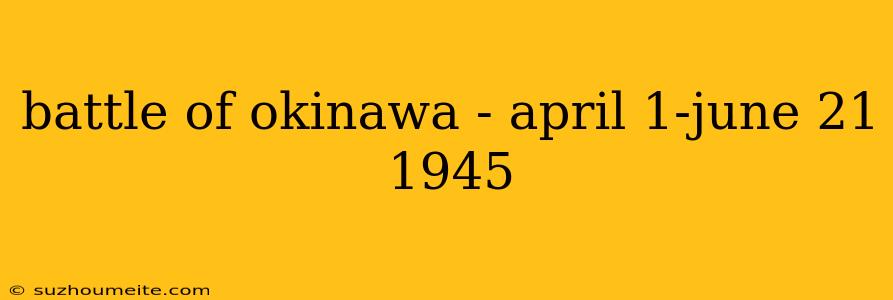Battle of Okinawa: April 1 – June 21, 1945
The Battle of Okinawa, fought from April 1 to June 21, 1945, was one of the bloodiest battles of World War II. This brutal struggle for control of the island marked a pivotal moment in the Pacific Theater, bringing the war closer to the Japanese mainland.
The Stakes
Okinawa, a strategically crucial island in the Ryukyu chain, held immense importance for both sides. For the Allies, capturing Okinawa was a steppingstone to invading mainland Japan. The island's airfields offered a perfect base for launching air strikes against the Japanese home islands. Meanwhile, for the Japanese, Okinawa represented a vital defensive line and a chance to inflict heavy casualties on the American forces.
The Fighting
The battle commenced with a massive amphibious assault on April 1, 1945. American troops faced fierce resistance from entrenched Japanese forces. The ensuing fighting was brutal and relentless, characterized by fierce hand-to-hand combat, devastating artillery bombardments, and relentless kamikaze attacks.
The Japanese Defense
The Japanese defenders, under the command of Lieutenant General Ushijima Mitsuru, were determined to defend their homeland to the last man. They had established a vast network of fortifications, caves, and tunnels, making their positions incredibly difficult to dislodge. The Japanese utilized a tactic known as "banzai charges," suicidal attacks where soldiers rushed enemy positions with grenades and swords.
Allied Advance
Despite the fierce Japanese resistance, the American forces, under the command of Lieutenant General Simon Bolivar Buckner Jr., gradually gained ground. The fighting was slow and methodical, with American troops painstakingly clearing each defensive position. The battle raged for over two months, resulting in heavy casualties on both sides.
The Aftermath
The Battle of Okinawa concluded on June 21, 1945, with a Japanese surrender. The victory came at a heavy cost: over 12,000 American soldiers were killed, and over 36,000 wounded. The Japanese casualties were even greater, with over 100,000 soldiers killed. The civilian casualties were also substantial, with an estimated 150,000 Okinawan civilians dying during the battle.
Significance
The Battle of Okinawa was a pivotal moment in World War II. It demonstrated the tenacity of the Japanese defense and the high cost of invading Japan. The battle also highlighted the devastating impact of modern warfare on civilian populations. The horrific experience of Okinawa significantly influenced the decision to use the atomic bomb on Hiroshima and Nagasaki, ultimately ending the war in the Pacific.
